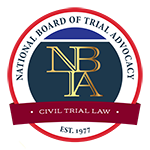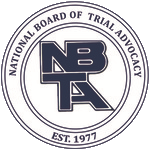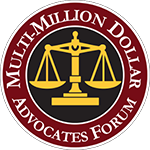
Any bump, sudden back and forth movement, jolt, or blow to the head has the potential to cause a concussion. While many concussion symptoms subside in the days and weeks following injury, the impact may last much longer for some victims.
This leaves many accident or injury victims wondering, can you drive with a concussion?
The attorneys at Golden Law Office strongly encourage our clients to defer all personal medical questions to their own doctors. However, we also recognize the importance of accessing general advice that might guide your discussion with your health care provider. We hope the information contained in the following article will be useful as you recover from your concussion.
What Is a Concussion?
A concussion is classified as a traumatic brain injury (TBI). Concussions are typically classified as mild TBIs because they are not considered life-threatening. Do not let the categorization of “mild” fool you—a concussion is a serious medical condition that requires prompt treatment from a medical professional.
The most common causes of concussions, according to the Centers for Disease Control and Prevention (CDC), are:
- Car accidents
- Falls
- Assaults
- Sports
- Unintentional strikes by or against obstacles
Symptoms of a Concussion
The majority of concussions do not result in a loss of consciousness, so do not rely on whether or not you were knocked out when deciding if you should go to the doctor. If you were hit in the head or experienced a sudden and violent shaking (such as the back-and-forth movement associated with rear-end collisions), take any possible indication of a concussion seriously and seek prompt medical attention.
Symptoms linked with concussions can be broken down into four main categories:
- Physical – Headaches, migraines, and sensitivity to loud noises or bright lights.
- Thinking/Remembering – Trouble recalling recent events, confusion, and mental fog.
- Mood/Emotional – Nervousness, irritability, and sadness.
- Sleep – Sleeping less or more than usual.
The symptoms of a concussion may last for a period of days, weeks, or even longer. Young children, teenagers, and older adults have the longest average recovery times and may require additional or ongoing care. Anyone who has already had a concussion may also have a longer than average recovery time.
Although most concussion symptoms resolve over time, a blood clot may form alongside a concussion in rare cases. This is a life-threatening condition that requires immediate medical intervention. Contact your doctor or go to the emergency room right away if you:
- Have a headache that will not go away or gets worse
- Are feeling weak or struggling with coordination
- Are nauseous or repeatedly vomiting
- Have slurred speech
- Cannot recognize friends, family, or places
- Experience increased confusion or agitation
Any loss of consciousness, convulsions, seizures, or unusual dilation of the pupils after a blow to the head should be treated as a medical emergency. Do not attempt to drive yourself. Call 9-1-1 or have a trusted individual take you to the nearest emergency room.
Is It Safe To Drive With a Concussion?
The general rule that most medical professionals follow is no driving in the first 24 – 48 hours after a concussion. This generalized rule does not apply to everyone’s situation, though. Even if you are outside the 48-hour window from the onset of concussion symptoms, do not drive if:
- You have trouble turning your head
- You are triggered by bright lights
- Symptoms worsen or are triggered by driving
For your safety and the safety of everyone else on the road, wait until your doctor has cleared you for driving. You are at a heightened risk of causing an accident if you choose to drive while actively experiencing concussion symptoms. Hitting your head a second time during the recovery process is exceptionally dangerous, so a car accident might turn a relatively mild concussion into a much more severe head injury.
You may also face legal consequences if you choose to get behind the wheel even while your doctor advises that you wait. If you are suffering from a concussion, you are considered to be impaired, and impaired driving is against the law in Kentucky.
When Can You Drive Again After a Concussion?
If driving is a daily activity necessary for your everyday way of life, you are probably eager to know when you can get back behind the wheel. If you are no longer experiencing any symptoms and your symptoms are not triggered by driving, you may be allowed to drive again anywhere from 24 to 48 hours after the accident.
Do not start driving without the clearance of your doctor. If you suffered a more severe concussion or are still dealing with issues like light sensitivity or confusion, it is not safe for you to drive.
When you are cleared for driving, start with short distances in familiar areas with minimal traffic and low speed limits. Bring someone with you who can take over driving should you experience any issues and need to take a break or stop driving altogether.
What To Do When You Can’t Drive
We understand that not being able to drive can place a hardship on some people, especially those who do not live in areas with quality public transportation. At Golden Law Office, we recommend the following alternatives for patients with concussions who are still unable to drive:
- Have a friend or family member drive you to your appointments
- Use a rideshare app or public transportation when you need to leave your house
- Have your groceries delivered
Securing Compensation for a Concussion
All it takes is one blow to the head to turn your life upside down. Medical bills from even a minor concussion can total hundreds or thousands of dollars, with more severe cases involving life-long medical costs. Missed paychecks from time off work to recover only further complicate your financial situation. You might feel lost wondering whether you can drive with a concussion and how you will get to your medical appointments.
If your concussion resulted from another person’s or entity’s negligent, wrongful, or reckless actions, you may be owed compensation. At Golden Law Office, we work with clients who have been injured in a wide range of personal injury cases, from car and truck accidents to defective products and more.
Don’t forfeit your right to take legal action for a concussion. Call our office or fill out our convenient online form to schedule a consultation with one of our personal injury attorneys. Your first meeting is always free, and there is never any obligation to partner with our law firm.






